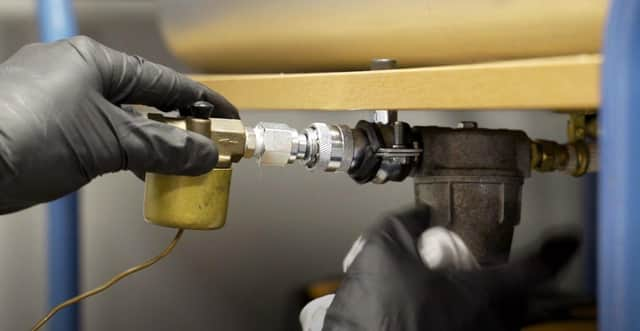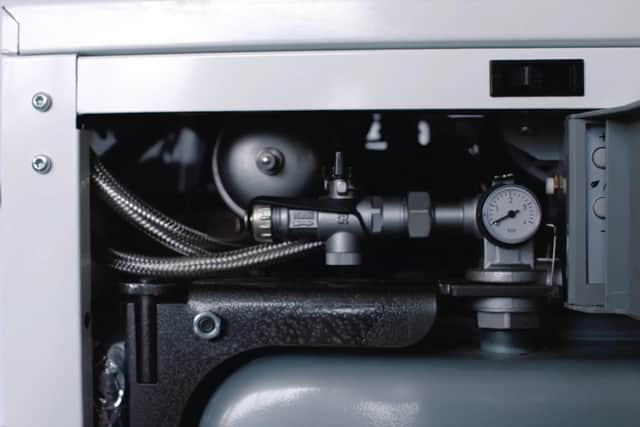Are renewable liquid fuels the answer to Northern Ireland’s carbon reduction targets?


It could cost over £8billion more to convert Northern Ireland’s oil heated homes to use heat pump technology rather than a renewable liquid fuel.
That was the claim from the three trade bodies representing the liquid fuel heating industry in Northern Ireland in their detailed response to the Economy Department’s consultation on policy options for the Energy Strategy for NI.
Advertisement
Hide AdAdvertisement
Hide AdThe consultation, which closed on June 30, proposed two broad approaches to phasing out fossil fuel heating oils for off-grid consumers. In one of these scenarios, oil boilers would be banned, which would place a significant emphasis on heat pumps for off-grid properties.


The second of these options is to retain liquid fuelled boilers and would instead focus on phasing out the sale of fossil fuels. This option would give consumers a range of options for their home heating including renewable biofuels and biomass in addition to heat pumps.
OFTEC, UKIFDA and NIOF, the trade bodies representing the industry’s manufacturing/registration and distribution sectors agree that change is required to help play a significant role as the UK seeks to meet its net zero ambitions.
But they point out that consumer choice and finding the right solution at the right cost, with the least amount of disruption for each home, is key to making the strategy work for everyone.
Advertisement
Hide AdAdvertisement
Hide AdIn their response to the consultation the trade bodies claim the cost of converting the 526,000 oil heated homes in Northern Ireland to heat pump technology would be £8.7bn.


Whereas the total cost, of converting all of Northern Ireland’s oil heated homes to utilise a renewable liquid fuel would be £618m.
OFTEC Ireland Manager, David Blevings said the bodies have already come together to present a ‘simple and cost-effective solution’ to the Department.
David continued: “We are not against consequential improvements; any energy strategy must have energy efficiency at its heart. But, with the average cost of install for an air source heat pump and associated works at £26,300 versus £500 for conversion of your oil-fired boiler to operate with renewable liquid fuel we advocate that changing the fuel is the easier option.
Advertisement
Hide AdAdvertisement
Hide Ad“In fact, changing the fuel that liquid fuelled boilers currently use to a low carbon fuel would offer immediate and substantial carbon reductions - a near 90% reduction in carbon emissions compared to traditional home heating oil.


“The fuel we propose is Hydrotreated Vegetable Oil (HVO) and our response to the consultation outlines the work that the trade associations have done to date across the UK with respect to the conversion of oil heated homes to a renewable liquid heating fuel.”
It is widely accepted that some homes (and non-domestic buildings) are not suitable for conversion to heat pumps and other solutions will be needed.
Both the Climate Change Committee (CCC) and the National Grid Future Energy Scenarios (FES) predict approximately 900,000 of UK based off-grid homes will require some form of renewable fuel other than electricity to provide home heating by 2050 to help meet the UK’s net zero commitment.
Advertisement
Hide AdAdvertisement
Hide AdLab trials and small-scale demonstrator field trials have confirmed that HVO has similar traits to kerosene while offering an 88% reduction in carbon emissions.
OFTEC Ireland Manager, David explained: “We believe the overall approach being suggested by the industry would allow policy flexibility while achieving rapid decarbonisation progress, providing a greater perception of fairness as there would be a viable choice even for hard-to-treat situations.
“It will also help create a more competitive market for low carbon heating.
“We are excited about the prospects of decarbonising the off-grid housing stock in Northern Ireland who use a liquid fuel. We have many advantages in terms of our local knowledge of the customer base and the proximity of our workforce to those customers.
Advertisement
Hide AdAdvertisement
Hide Ad“The current cost of renewable liquid fuels is higher than traditional heating oil and, while the cost of conversion is much smaller than other solutions, we see this as a potential barrier for our customers. We need to stimulate the supply of the fuel to reduce the cost.
“If the duty on liquid renewable fuels was removed this would save each home approximately £200 and if the same incentive was given as for the transport sector in renewable certificates this saving would mean the annual increase between using HVO and kerosene is only £213pa, which is within the margin of kerosene increases seen over the years.”
The trade bodies are calling on the Northern Ireland Executive to work with them now, to actively promote the introduction of a renewable liquid fuel to homes currently heated by oil.
They say this could be achievable in a timescale which would exceed expectations, enhance workforce opportunities, and allow customers, to decarbonise at limited cost and disruption.
Advertisement
Hide AdAdvertisement
Hide AdOFTEC, UKIFDA and NIOF are asking the Northern Ireland Executive for the following help:
Work with Westminster to remove the current c11p duty on renewable heating fuels to stimulate uptake.
Introduce a short-lived incentive scheme (as has been the case in transport fuels) to stimulate the early adoption of the fuel and therefore supply.
Include renewable heating fuels in current government schemes such as NISEP
Advertisement
Hide AdAdvertisement
Hide Ad To actively promote all decarbonisation solutions in a technology neutral way that reflects the individual nature of people’s homes and choices.
To actively remove trade barriers to low carbon fuels.
To work with the industry to support a larger scale trial in Northern Ireland to demonstrate the potential for the adoption of renewable liquid fuel.
Concluding their response to the consultation, the trade bodies said they firmly believe that a move from kerosene to renewable liquid fuel (HVO) offers the Executive a simple, cost effective solution to decarbonising the off-grid sector.
With the correct policy and support the transition could be easily delivered within five years and substantial carbon reductions achieved.
A message from the Editor:
Advertisement
Hide AdAdvertisement
Hide AdThank you for reading this story on our website. While I have your attention, I also have an important request to make of you.
In order for us to continue to provide high quality and trusted local news on this free-to-read site, I am asking you to also please purchase a copy of our newspaper whenever you are able to do so.
Our journalists are highly trained and our content is independently regulated by IPSO to some of the most rigorous standards in the world. But being your eyes and ears comes at a price. So we need your support more than ever to buy our newspapers during this crisis.
With the coronavirus lockdown having a major impact on many of our local valued advertisers - and consequently the advertising that we receive - we are more reliant than ever on you helping us to provide you with news and information by buying a copy of our newspaper when you can safely.
Advertisement
Hide AdAdvertisement
Hide AdYou can also enjoy unlimited access to the best news from across Northern Ireland and the UK by subscribing to newsletter.co.uk
With a digital subscription, you can read more than five articles, see fewer ads, enjoy faster load times, and get access to exclusive newsletters and content. Visit https://www.newsletter.co.uk/subscriptions now to sign up.
Thank you